Hussam al-Mahmoud | Hassan Ibrahim
The initiative of the dissident Brigadier General Manaf Tlass, the former friend of the head of the Syrian regime, Bashar al-Assad, about a transitional period in Syria has opened the door to questions about it at a time when the Syrian file is returning to the political front again on an international and Arab level to revive the political solution according to the frozen Security Council Resolution 2254 despite the “praising” of all parties involved in the decision.
The initiative of the son of the former Syrian Defense Minister, Mustafa Tlass, comes with broad titles, such as “preserving civil peace,” “protecting stability,” “seizing uncontrolled weapons,” and “providing a national platform for joint action” in the presence of opposition political bodies on the ground and civil society organizations spread both inside Syria and abroad.
In this file, Enab Baladi discusses the extent to which this initiative is applicable in light of the current political changes and the position of the Syrian political opposition towards it.
Enab Baladi also allows the Military Council and the Syrian Interim Government (SIG) to present their views on the initiative and the feasibility of reproducing political proposals and initiatives that do not cancel what already exists.
Timing
On June 9, Manaf Tlass, 59, put forward a political initiative summed up in a transitional phase in Syria, including the collection of weapons and the preservation of civil peace, in order to reach a political solution, considering the Military Council project as part of the civil democratic approach.
In an interview with al-Quds al-Arabi newspaper, Tlass revealed the arrangement of his work mechanism for the next stage, according to international capabilities.
He explained that the goal of the Military Council is to seize uncontrolled weapons, confine them to the “national military” institution, preserve civil peace, and protect stability in the next stage.
Among the goals of the Military Council is also to contribute to providing a safe environment for the recovery phase, to reach a political solution and a credible political process in accordance with United Nations resolutions and the aspirations of the Syrian people, he said.
Tlass sees the Military Council as part of the general Syrian movement with all its gatherings and that it is not a substitute for these gatherings.
Rather, it works and will work with the Syrian civil, political, and economic groupings according to common national goals, stopping the Syrian bloodshed and providing a national platform for joint action to reach a general political solution.
He also talked about the always-existing external political support for the Military Council in terms of accepting the project and the need for it, given that it is necessary in the course of the transitional period, considering that the conditions of its work and its programs have remained secret during the past years due to their nature.
Tlass’ proposal, which focused on rearranging the working mechanism, talking about a “new struggle strategy,” and launching a “national liberation movement,” came in light of the recent active political changes and movements taking place in the Syrian file, at the level of meetings and discussions, in addition to the state of Arab normalization with Bashar al-Assad, which clearly expressed itself after the February 6 earthquake that rocked northern Syria and southern Turkey.

Salem al-Meslet, head of the Syrian Opposition Coalition (R), Abdurrahman Mustafa, the President of the Syrian Interim Government (C ), and Fahim Issa, Commander of the Second Corps in the Syrian National Army (L) – March 17, 2023 (Twitter/Abdurrahman Mustafa)
Opposition in Geneva
Less than a week before the Tlass initiative, the Syrian opposition ended its meeting in Geneva, which was held for three days (from 2 to 4 June), and included all the components of the negotiating body since 2019, and met with the UN envoy to Syria, Geir Pedersen, and then met with representatives of several countries active in the Syrian file.
The closing statement of the meeting called for fixing the political mistakes of the opposition and “reconsidering political practice, refraining from practicing self-destruction and drawing lessons from mistakes to reform the political house” while adhering to Security Council Resolution 2254.
The meeting of the Negotiating Commission was preceded by the announcement of the entities belonging to it to send their representatives or their participation in the meeting, including the Moscow Platform, whose chairman, Qadri Jamil, announced his return to participate in the meetings after a break of more than three and a half years.
The meeting, on June 7, was followed by a statement by the head of the Negotiation Commission, Dr. Badr Jamous, to the Russian Sputnik agency, in which he declared the Syrian opposition’s readiness to negotiate directly with the Syrian regime in all files.
At the time, Jamous stated that the Commission is convinced that the political solution is the basis and that UN Resolution 2254 related to the ceasefire and political settlement is the compass.
UN Security Council Resolution 2254 (2015) demands compliance with international law, stresses protection of civilians and unfettered humanitarian access, a nationwide ceasefire that is linked to the political process, addressing terrorism, implementing confidence-building measures, safe and voluntary refugee returns, and releasing arbitrarily detained persons. These are the means by which the Syrians, and no one else, should determine their future.
Madaniya in Paris
Amidst all developments, a MadaniyaConf2023 was held in Paris, and the two-day conference took place on June 5-6 June. The civil initiative was organized by the Madaniya Network and brought together about 150 Syrian civil society organizations and actors.
Madaniya, a Syrian-led initiative, describes itself as being “independent of political and foreign influence” and “aimed at enhancing the political agency of the Syrian civic space.”
According to a statement issued by the Network’s official website, Madaniya aims to mobilize Syrian civil actors inside Syria and in neighboring countries and the diaspora around a set of values based on rights to organize within a unified civil space.
Regarding the extent to which there is a connection between the MadaniyaConf2023 and the Tlass initiative, which considered the Military Council as part of the general revolutionary movement, Rania Ali, communication officer at Madaniya Network, explained that the main focus of the Madaniya initiative is the Syrian civil space, with an emphasis on the Pioneering role of Syrian civil actors in line with Resolution 2254.
Ali said they are “not engaged in any way in coordinating, participating in, or communicating with any newly emerging non-civil initiative.”
And she continued, “However, we strongly hope that all current and future endeavors to support a political solution in Syria will work in accordance with Resolution 2254 in a way that enhances the participation of Syrian civil actors in shaping the future of Syria, respects human rights, and strives to achieve sustainable stability.”
Arab rapprochement with al-Assad
The earthquake that struck the cities of northern Syria on February 6 broke the political stalemate, opening the door for several Arab countries that rushed to open high-level channels of communication with the Syrian regime.
After Arab ministerial visits, which came for the first time since the outbreak of the Syrian revolution, the Syrian regime participated in Arab political meetings, including the meeting of the foreign ministers of the Gulf Cooperation Council countries, Egypt, Iraq, Jordan, and the regime in Jeddah on April 15.
The regime’s foreign minister, Faisal Mekdad, also participated in the Amman consultative meeting, which included the foreign ministers of Iraq, Jordan, Saudi Arabia, and Egypt, leading to al-Assad’s participation in the Arab summit held in Jeddah on May 19, and Saudi Arabia’s official normalization of relations with the Syrian regime.
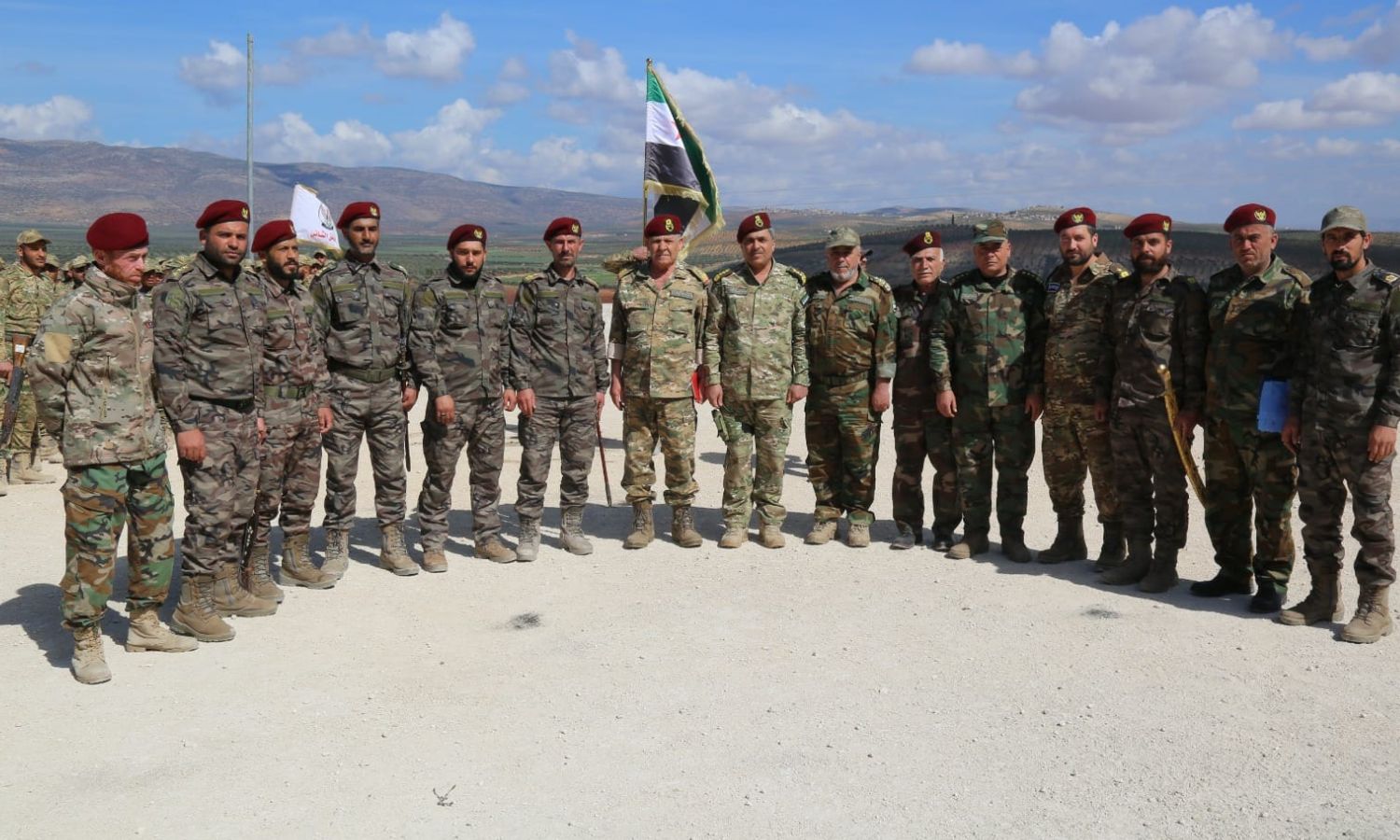
Graduating a batch of fighters of the Turkish-backed Syrian National Army in the northern countryside of Aleppo – March 7, 2023 (SIG’s Defense Ministry’s media office)
Renewed roadmap planDespite the recent appearance of Manaf Tlass’s initiative about the transitional period, the proposition is not new. In February 2021, the Saudi newspaper Asharq al-Awsat published what it said was a “written document” from opponents in the Moscow and Cairo platforms, which included a proposal submitted to Russia to form a military council. It is shared between the regime and the opposition during a transitional period, the duration of which is agreed upon, which was denied by both platforms. In the same context, the well-known Syrian dissident and actor Jamal Suleiman said on February 12, 2021, that he came up with the idea of a “military council” to assume transitional rule in Syria and discussed the idea in Russia and that there are those who believe in it. He explained that he, in his personal capacity, proposed the idea of a “military council” as an alternative formula for the body of transitional government contained in the Geneva Document during his meeting in Moscow with the Russian Foreign Minister Sergey Lavrov on January 21, 2021. |
Military Council as a “Temporary Body”
The Syrian Military Council defines itself as a temporary “functional body” with a specific mission within a limited time frame, which is to create a safe and neutral environment as an indispensable condition for a successful political transition.
The Council derives its necessity from Security Council Resolution 2254, and that it is a politically neutral institution that aims to restore a minimum level of stability and security to allow the rebuilding of the institutions of the Syrian state.
The existence of the Military Council was officially announced according to a statement issued in January 2021, and 1,600 defected officers and 600 non-commissioned officers declared their support for the Council and their willingness to work under its banner.
The Military Council stated that because of the background of its leading officers (they previously held high positions without ideological or religious bias) and their relations with members of the regime’s security apparatus, this body has strong potential to reassure all Syrian sects and to serve as a tool for building bridges with the security apparatus affiliated with it to the government and other groups on the ground.
In addition to being able to achieve what seemed impossible with political figures to establish a transitional governing body.
Reports about a military council led by Tlass appeared since July 2012, with scattered news that had no official source, with what was called leaks of lists that included the names of a new government representing the transitional authority in Syria, which were denied at the time.
The talk has become public since February 2021, after the Russian newspaper Nezavisimaya Gazeta published an article by the Syrian opposition journalist Yasser Badawi calling for the formation of a military council “in agreement between the active parties in Syria, headed by Russia.”
On February 9, 2021, the Saudi Asharq al-Awsat newspaper reported that Moscow had received proposals from Syrian dissidents, calling for the formation of a joint military council between the regime forces, armed opposition factions, and dissidents, which was followed by opinions varied between support and opposition.
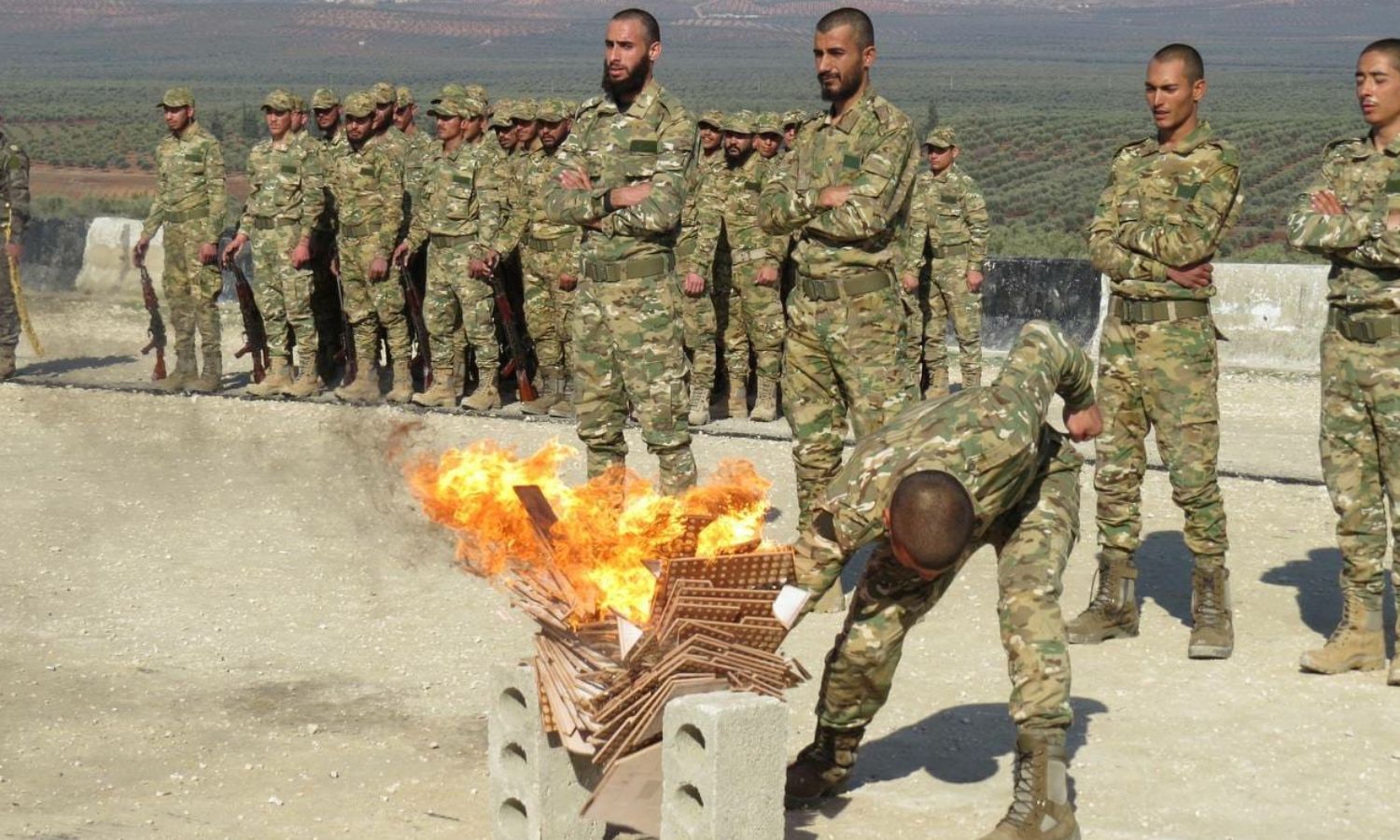
Graduating a batch of fighters of the Turkish-backed Syrian National Army in the northern countryside of Aleppo – March 7, 2023 (SIG’s Defense Ministry’s media office)
What does the Military Council say?
Doubts and criticisms surround the Syrian Military Council led by Brigadier Tlass, considering it an illusion and non-existent and that the transitional phase and arms control initiative that Tlass is launching is not applicable, especially with the repeated propositions over the past years.
Brigadier General Fayez Amr, a senior official in the Military Council, told Enab Baladi that the Council has its secret activities, especially with the security situation in Syria due to the special arrangements of a security and military nature, in coordination between its committees, members, and groups in all Syrian regions.
It is not possible to talk about an exact number of the Military Council members, but it is the broadest umbrella for the dissident officers among all the military blocs, and it seeks to be the main umbrella for all the dissident officers, whose numbers reach more than 5,000 officers, who joined the Military Council and participate in its activities according to their capabilities and within the limits of the current work.
There are officers from the regions of the regime who are in contact with the Military Council within their security conditions. They share a unified position to restore the national role of the Syrian military institution and to restore it to be the institution of the people, not the ruling authority.
According to Brig. Amr, the activities of the Council at the current stage and the internal and external conditions of the Syrian file are represented in organizational meetings and workshops related to the Council’s specializations, whether in dealing with the entitlements of the transitional phase and the mechanisms for ensuring and protecting this phase or in what is related to arms control and chaos. At this stage, in the interest of preparations for the political process or specialized workshops in rearranging the military establishment,
In addition to dealing with cross-border threats and other problems at each stage, these activities are organized under the supervision of specialized committees.
Among the activities are internal and international meetings with Syrian and international partners, civil society, and others.
The most recent of which was the first consultative meeting that was held via the Zoom platform on June 20, with the participation of 150 military, civil, and political figures, in which a discussion took place on the best mechanisms for working on the Syrian National Liberation Movement project, which the Military Council recently announced its launch, and the role of Syrian groups, forces and parties in the movement, according to Amr.
Meetings, foreign support
Regarding the meetings of the members of the Military Council with personalities from abroad, and the presence of external support and internal acceptance, Amr explained the absence of any outputs after those meetings by protecting the members of the Military Council from the threats of the regime, and any other parties that see any project of discipline in the region as a threat to them.
Therefore, work is being carried out according to a gradual work mechanism that takes into account the Syrian situation and the developments of the file, just as the Military Council does not present itself as responsible for the political solution in Syria at any meeting but rather it is part of the work tools in the Syrian file to achieve progress, and within its competence only, Amr says.
When the consultations for these programs are over, they will be disclosed in full transparency, he added.
On the level of internal representation, Brig. Amr explained that the current representation of the Council is commensurate with the stage, and whoever speaks in his name is known inside, and he has made many statements on local, Arab, and foreign media for years, and a number of representatives of the Military Council inside are also known, and some have their names kept secret for security reasons, especially in areas controlled by the regime.
He indicated that the next stage will have movements commensurate with it as well, and the work will be at the level of international and Syrian offices and coordination committees after the completion of the preparations for the general project of the Council, which is the Syrian National Liberation Movement.
“By observing the whole scene and the events that took place during the past years, and the results that external support and intervention with all Syrian parties led to, we found that the relationship with the outside should be careful and deliberate,” Amr said.
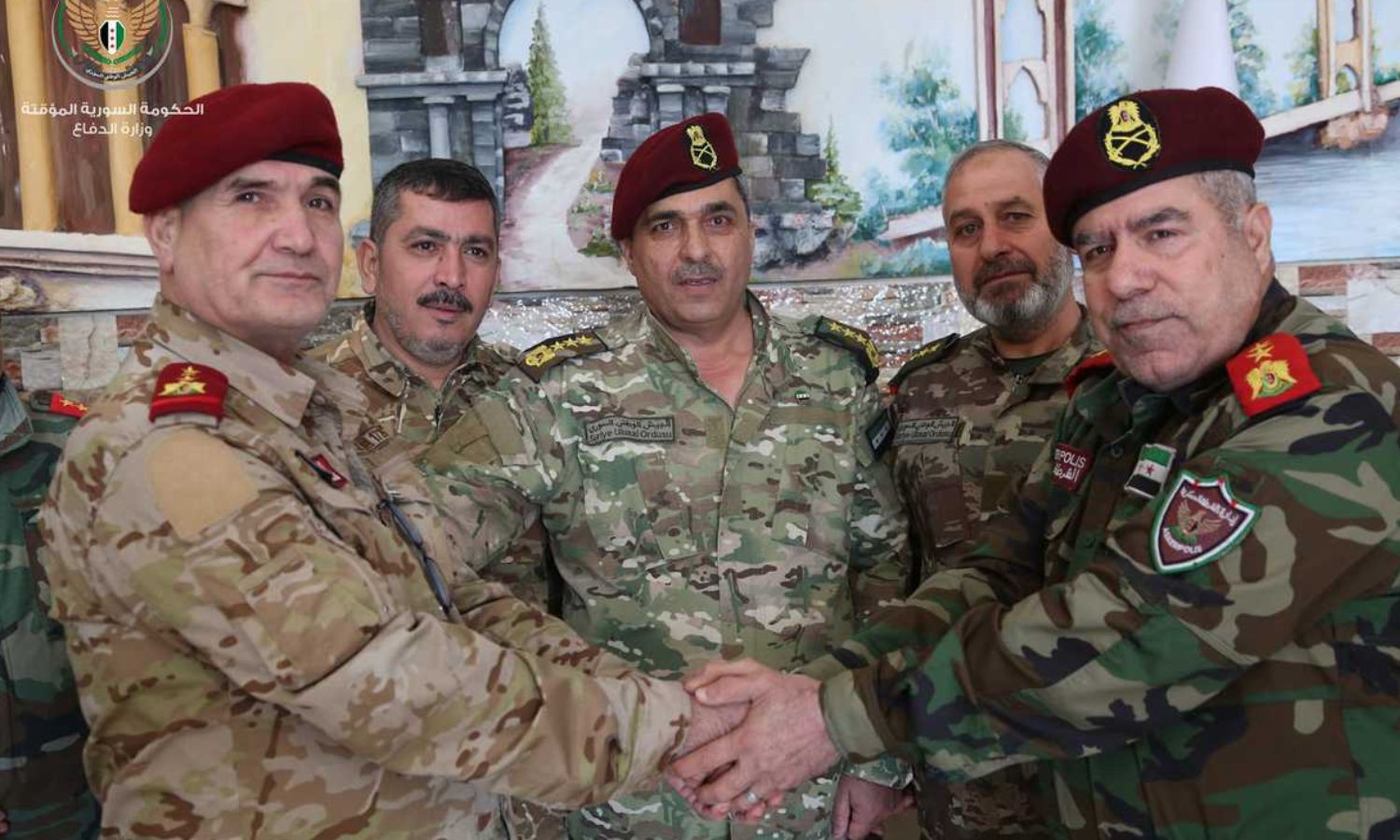
Interim Government’s Defense Minister and legion commanders of the Syrian National Army – January 9, 2023 (SIG’s Defense Ministry’s media office)
Obstacle is in support mechanism
Any relationship with a foreign party cannot be considered a relationship of dependence on an external will, and it is not possible in any activity related to states and international and internal relations to neglect talking about international and local supporters and partners, according to the leader in the Syrian Military Council.
Brigadier Amr considered that the problem is evident in the support mechanism related to subordination and not to joint projects.
The Military Council adopts work according to a national mechanism that guarantees independence in relations with partners and allies, he said.
Amr added that the Council’s mechanism is also based on building a relationship of interests based on the aspirations of the Syrian people and not subordination to any other project, internal or external. “Here, the international and local partner in these programs is part of this approach, not contrary to it.”
Regarding communication with the Syrian opposition institutions, bodies, and political entities, Amr confirmed that the Council is in contact with all Syrian parties, and it does not exclude influential countries from the discussions either.
However, the communication mechanism is not the same for everyone, as there are those who are contacted directly, and some through Syrian or international partners, Amr revealed.
The goal of communication is to contribute to the ripening of a suitable ground for an inclusive, independent national project that meets the aspirations of the people, with openness to all those who lend a hand to the project from the Syrian parties, and to focus on the positive aspects of the differences over some issues, according to the leader in the Military Council.
Regarding the possible time for announcing the details of the initiative, Amr said that they are waiting for the completion of the discussions and preparations for the project, both internally and internationally.
“The project is not separate from the internal and external transformations, and the factor of its coming to light and the time required for that is related to the completion of the discussions, and not producing an incomplete project that leads to failure, as happened to some other projects whose details were hastily announced, without taking into account the extensive preparations for them,” he added.
|
The initiative is waiting for the completion of the discussions and preparations for the project internally and internationally, as the project is not separate from internal and external transformations. The completion of the initiative is linked to the completion of the discussions in order not to produce an incomplete project that may fail, as happened to some other projects whose details were rushed to announce without taking into account the extensive preparations for them. Brig. Gen. Fayez Amr, senior commander in the Syrian Military Council |
Stance of Interim Government?
The head of the Syrian Interim Government, Abdurrahman Mustafa, revealed the position of the National Coalition’s body from the Tlass initiative and whether there was any contact with Manaf Tlass about it.
Mustafa told Enab Baladi via email that the Syrian Interim Government, represented by the Ministry of Defense, has worked to organize the factions of the Syrian National Army (SNA), structuring and training it on the basis of military professionalism and adjusting practices in accordance with the principles imposed by international humanitarian law and international human rights law.
“Therefore, orders and circulars were issued calling for the need to confine weapons to military barracks and to remove military units and all armed manifestations from city centers, and steps were skipped in this, and the military police and military judiciary were recently restructured and organized,” he said, adding “We put in our list of responsibilities everything that leads to achieving security and stability in northern Syria, creating conditions for a comprehensive political solution, and reaching beyond the transitional stage,” added the head of the Interim Government.
Mustafa also considered that the National Coalition for Revolutionary and Opposition Forces performs its roles and responsibilities, and efforts can be unified within its framework.
There is also the Negotiations Commission, which includes many platforms, and what is seen as opposition spectra from outside the National Coalition. Therefore, there is no justification for continuing the approach of presenting new formations and bodies every time, as he put it.
In response to a question about the possibility or applicability of the Tlass initiative at the present time, Mustafa stressed that security and stability can only be achieved in Syria by taking confidence-building measures in society.
“This requires a comprehensive and radical reform of the security sector and the rebuilding of the (regime) army, which has turned into a “killer gang in the interest of the regime instead of protecting and defending the people.”
The head of the Interim Government also pointed out the necessity of dissolving the security services involved in committing crimes and violations against the Syrians, disarming them, disbanding what he described as “criminal armed militias” recruited by the regime to practice murder and crime, and expelling foreign sectarian militias brought in by Iran and Russia.
Mustafa said, “In the northeast, there are armed separatist militias with their own agendas and their own separatist project that they took up arms to achieve at the expense of the people’s sacrifices, which makes the task very difficult without an international will, which is not available at the present time.”
In contrast to these parties, there is the SNA, which originally consists of civilian revolutionaries who were forced to take up arms in defense of their families and honor and dissident officers and soldiers who refused to get involved in killing their own people.
They are not the problem but rather the solution that must be built upon, according to Mustafa.
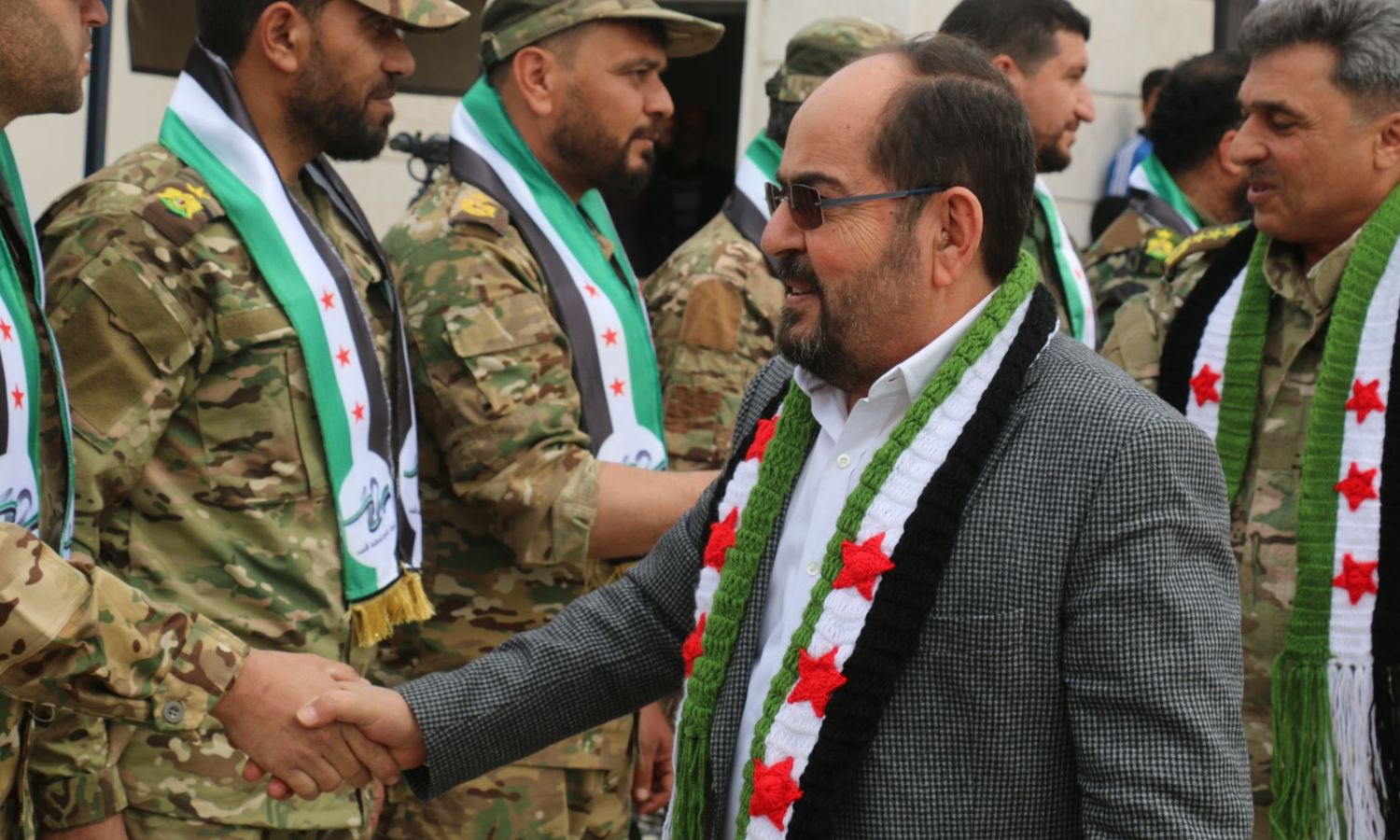
Abdurrahman Mustafa, President of the Syrian Interim Government, and Hassan Hamada, Minister of Defense – March 17, 2023 (Twitter/Abdurrahman Mustafa)
|
Understanding facts and circumstances help in dealing with proposals for disarmament and its control, and this means starting with the parties that pose an imminent threat and danger to the Syrian people (the regime’s militia and the SDF). Abdurrahman Mustafa – Head of the Syrian Interim Government |
No contact with Tlass
Regarding whether the current introduction of a new initiative is an indication of the weakness of the existing military bodies, Abdurrahman Mustafa believes that the SNA factions have worked to follow and implement the military professional approach to enhance their capabilities theoretically and practically, and the factions have also been able to achieve qualitative development with simple capabilities and self-efforts and Turkish assistance by moving from factionalism to organized work.
The factions play an honorable role in confronting “the criminality of the regime forces, separatist militias, and terrorist forces.” Therefore, the military bodies are strong and in the process of being built, according to Mustafa.
The head of the Interim Government also confirmed that there was no communication or coordination with Brig. Tlass or others regarding this initiative.
Mustafa made it clear that the official opposition institutions, out of their concern for the interest of the people and the revolution, are ready to work with all parties that seek to end the tragedy of the Syrian people in a way that achieves their aspirations and preserves their dignity, within the frameworks of international legitimacy and that the doors of the opposition institutions are open, not closed.
Commenting on the issue of uncontrolled weapons, Mustafa believes that uncontrolled weapons are the ones that were directed to kill people through bombing by air, artillery, missiles, and barrel bombs, which led to massacres and the destruction of residential neighborhoods over the heads of civilians.
“This weapon must be controlled and stop the practice of killing and criminality,” he asserted.
In addition, the regime left weapons in the hands of its militias as a reward for fighting with it. Therefore, the regions of the regime are currently living in their worst conditions of arms chaos and complete lack of security, where armed gangs wreak corruption outside the scope of the law and the judiciary.
Mustafa explained that the SNA factions, unlike the regime forces, organized the legions and followed the regulations and laws, which achieved tangible results on the ground.
|
Tlass’s initiative is adequate. Everyone hopes that there will be a stage of transitional rule in which Bashar al-Assad and his circle will be outside the government. The uncontrolled weapons within the capital, Damascus, are the ones that must be collected. Among the folds of the decision, the naturalization of the Afghan militias must be abolished, and if the Military Council controls military decisions, this will be very helpful to the Syrian people. Abdullah al-Asaad – Defected brigadier general and a military expert |
|
The seizure of uncontrolled weapons is a valid matter, and it must be worked on whether with or without Manaf Tlass, and this matter is the task of the transitional government after the fall of Bashar al-Assad’s regime. It is the duty of any coming transitional government to fully control and legalize weapons and integrate the parties qualified for integration into the armed forces, security, or police. Those who cannot be controlled must be disarmed. No authority can accept the presence of uncontrolled weapons on its territory, not like the criminal regime of Bashar al-Assad. Tariq Haj Bakri – Defected army officer and a military analyst |
|
We live in exceptional circumstances and a state of war that witnesses the bombardment of cities and towns every now and then, whether by the regime or separatist militias. In light of these circumstances, the degree of organization and control of weapons in the regions of northern Syria is more than good, but there is a need for more efforts and a transition towards the gradually established military institution. Abdurrahman Mustafa – Head of the Syrian Interim Government |
Tlass, Political Solution Guest
In civilian clothes and in a written speech addressed to the Syrian people, Brigadier General Manaf Tlass, 59, appeared in June 2012 to announce from Paris his defection from the Syrian regime forces after he was the commander of one of the elite brigades in the Republican Guard.
Tlass is considered a member of the inner circle of the Assad regime and one of the pillars of the military establishment until the date of his defection.
He is the son of the former Minister of Defense, Mustafa Tlass, whose tenure was divided into the rule of the Assad family, father and son, for more than thirty years.
The closeness of age between him and Bashar al-Assad also contributed to the consolidation of a friendship that began in childhood between them and lasted for about 12 years of Bashar’s rule after the death of his father.
Tlass was born in the city of al-Rastan in central Homs governorate to a family with a long history in the military.
He did not place himself after the defection under the banner of the existing military formations, nor did he occupy a “revolutionary position.”
At the same time, he maintained a presence that expresses itself when talking about the stage of the political solution, the transitional stage, or reaching a military body that would bring together what was separated by 12 years of unilateral military action in one place and unorganized in another.
if you think the article contain wrong information or you have additional details Send Correction
النسخة العربية من المقال
-
Follow us :
Most viewed
- 311 casualties among government forces and civilians in Syrian coast
- Al-Sharaa and Abdi reach agreement on merger of SDF into Syrian state
- Syrian Defense Ministry appoints "Abu Amsha" as Hama Brigade commander
- Did Syrian state fall into coastal ambush?
- Rights organization documents government and civilian deaths in Syrian coast












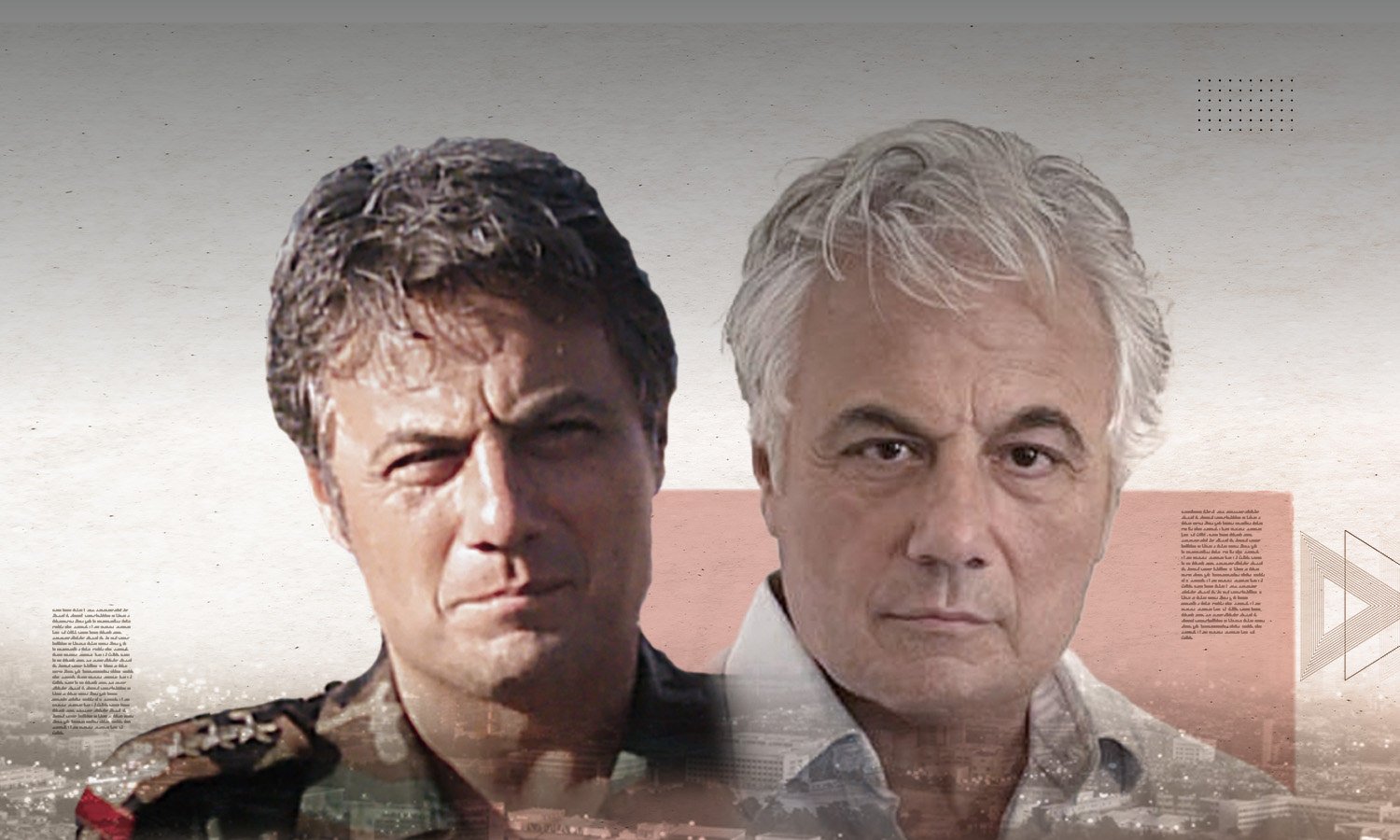
 Manaf Tlass, Defected Brigadier General of the Syrian Republican Guard and a childhood friend of Bashar al-Assad (edited by Enab Baladi)
Manaf Tlass, Defected Brigadier General of the Syrian Republican Guard and a childhood friend of Bashar al-Assad (edited by Enab Baladi)





 A
A
A
A
A
A



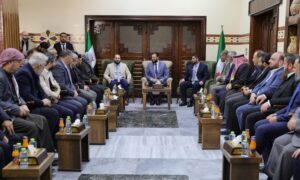
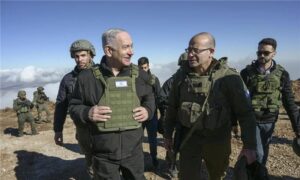
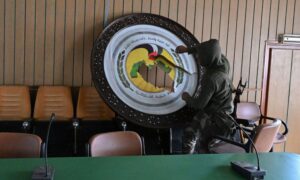
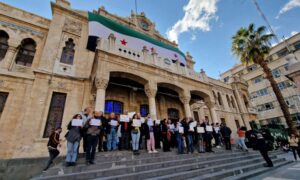
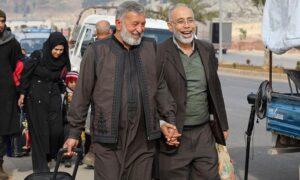
 More In-Depth
More In-Depth